
LNS 62 W
فريز خشبي، ربما كان جزًءا من أحد القصور، يحتوي على صفوف من العقود المستدقة الأطراف، تحتوي بدورها على تكرار معكوس
تشتمل القطع المصنوعة من العاج والخشب على عناصر معمارية زخرفية مثل العوارض والأبواب، وبعض المشغولات الأصغر حجماً كالصناديق، والمجوهرات، وقطع الألعاب، حيث نجت القليل من هذه القطع بسبب قابلية الخشب والعاج للتلف.
ومع ذلك، وجد تمثال على شكل امرأة واقفة، وهو مصنوع من العاج حوالي 2450-2350 قبل الميلاد من سوريا أو بلاد الرافدين، وهو مثال رائع يشهد على مهارات الحرفيين في العصور ماقبل الميلاد، والذي تضمن تطعيما غائرا للعين، والحواجب، بالإضافة لوجود ثقوب تشير إلى إضافة قطعة شعر.
كان العاج يستخدم إبان العصور الإسلامية، وكان الكثير منه يشبه التقليد البيزنطي في بداية الأمر، وقد تم التبرع بالعديد من القطع المصنوعة من العاج والتي تمت صناعتها في الأراضي الإسلامية إلى اوروبا، وكانت تحظى بتقدير كبير في فترة العصور الوسطى وخاصة الكنائس، حيث لاتزال الى يومنا هذا محفوظة في خزائن الكاتدرائيات، وقد استمر إنتاج القطع الفنية الجميلة، من قبل الحرفيين المسلمين وغيرهم، لرعاة المسيحيين في أعقاب الحكم العربي في ايطاليا وإسبانيا. وغالبا، كان يستخدم العاج في صناعة مقبض السيوف والخناجر، وبعض المشغولات الصغيرة للزينة مثل أبازيم الحزام، والتي تم تمثيلها بشكل مميز من الإمبراطورية العثمانية و في الهند.
كما استمر إبداع الفنانين في العصر الإسلامي من خلال بعض التقنيات والتي تم استخدامها منها تقنية “الشطف”، والتي تم استخدامها في القرن التاسع الميلادي وتحديدا في العصور الوسطى، من خلال إضافة الأنماط الهندسية المعقدة، والتي كانت تستخدم لتركيبات الأبواب والأثاث، ولاسيما المعروفة في المنابر وقوائم القرآن في المساجد، فقد تم تطوير أسلوب نحت مختلف تماما في الغرب الإٍسلامي، حيث تم استخدام نمط الزخارف النباتية المزهرة، والتي غالبا مايتم تمييزها برسومات متعددة الألوان.

فريز خشبي، ربما كان جزًءا من أحد القصور، يحتوي على صفوف من العقود المستدقة الأطراف، تحتوي بدورها على تكرار معكوس
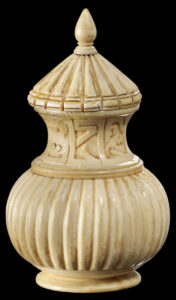
ُحٌّق من العاج ومنقوش عليه بالخط الكوفي (بطريقة معكوسة رأسيا) ابتهال إلى الله: “يا قاضي الحاجات، يا كافي المهمات”.
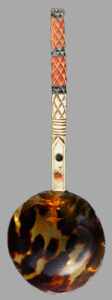
مجموعة من عشر ملاعق فخمة، مصنوعة بشتى المواد، منها: المرجان، والصدف، والعاج، وأصداف السلاحف، وقرون الحيوان، وقشور جوز الهند، والخشب،
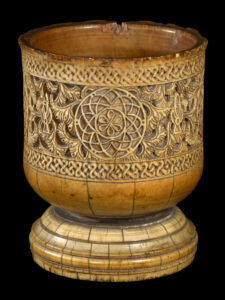
هاون من العاج، مزخرف بالحفر بشرائط مجدولة عند الحافَتين العلوية والسفلية. أما البدن، فتزينه أربع رصائع هندسية، على أرضية من
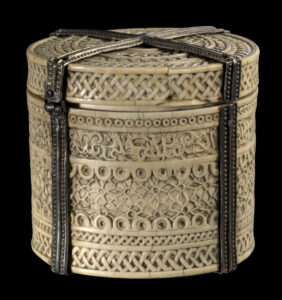
علبة من العاج مع غطاء، تزينة زخارف نفذت بالحفرعلى شكل شرائط أفقية، وأشكال هندسية متشابكة، وكتابات بخط النسخ هذا نصها:
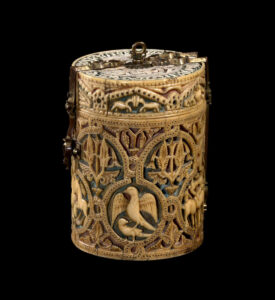
علبة من العاج، عليها نقش بالحفر البارز بُصور حيوان وحيد القرن، وطيور وأشكال نباتية؛ على حافة الغطاء، وجوه آدمية وذوات
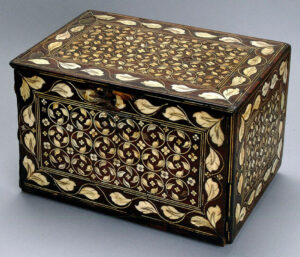
صندوق خشبي له واجهة معلقة تفتح للأمام للوصول إلى الأدراج الداخلية، مطَّعم بالعاج والعظم على شكل زخارف من الأزهار (من
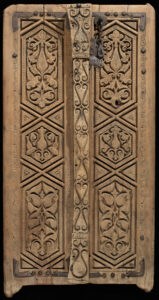
باب خشبي (يتكون من درفَتين وعمود في الوسط)، ُنفذت عليه زخارف أرابسك بالحفر الغائر، تتمثل في وحدات سداسية الأضلاع، تملؤها
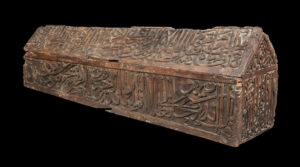
ضريح تذكاري من الخشب، ُنقشت عليه بخط الثلث كتابات تبعث على الطمأنينة، منها الآية 62 من سورة يونس: “ألا إن
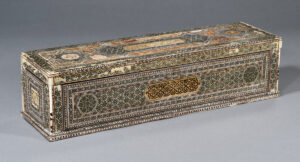
صندوق خشبي لأدوات الخطاط، مطعم بالخشب والعاج وعظم مصبوغ، ومغشى بألواح من العاج المطلي بالذهب.
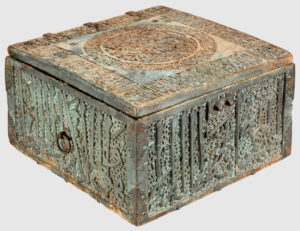
صندوق خشبي من روائع فن الحفر، ُصنع لحفظ مصحف من ثلاثين جزًءا، ُنقش عليه بخطي الثلث والنسخ آيات من القرآن
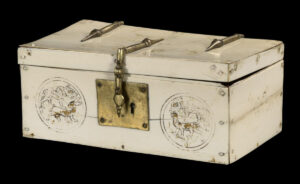
علبة من العاج، بها تركيبات من البرونز المذهب، وزخارف على شكل رصائع تضم في داخلها صوَر طيور متقابلة ومتدابرة، ومشاهد
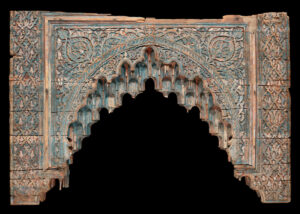
رأس محراب خشبي، ذو تصاميم ورقية منحوتة، ومقرنصات تبطن الجدار الداخلي لكل عقد.
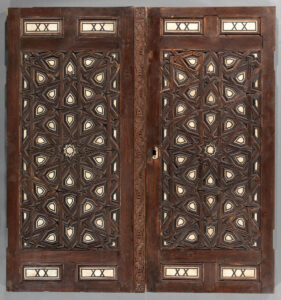
درفًتي باب خشبي، أو درفة باب خزانة مطعم بالعظم، ذات تصميمات نجمية تتكرر بشكل لانهائي (المخطط المكرر عبارة عن معينات
قد يعجبك أيضًا
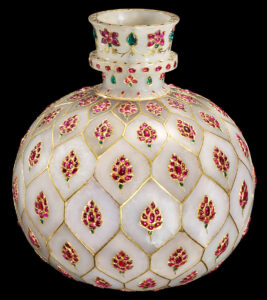
تحتوي مجموعة الصباح الآثارية على مجموعة لامثيل لها من المجوهرات والأحجار الكريمة، ولا تجسد مدى جمال القطع فقط، بل المهارات الجمالية والتقنية لأجيال من الحرفيين والفنانين.
إضافة لكونها المجموعة الأكبر والأكثر احتواءً على المجوهرات الإسلامية في العصور الوسطى على مستوى
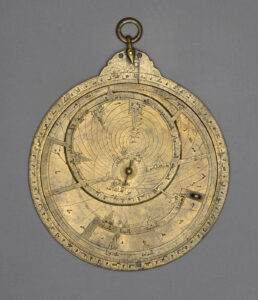
تحتوي مجموعة الصباح على مايقارب من ألفي تحفة من المشغولات المعدنية، تتنوع مابين الأواني المصنوعة بشكل متقن والمطعمة بالمعادن الثمينة، وبعض التيجان المصنوعة من البرونز وتحمل رموز حيوانات. غالبا مايصنع عمال المعادن في العالم الإسلامي، سواء في القاهرة أو في
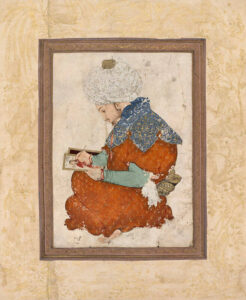
تحتوي مجموعة الصباح على عدد وفير من مخطوطات القرآن الكريم، والتي تضم صفحات مزدوجة لواحدة من أقدم المخطوطات القرآنية المعروفة، والتي تم نسخها في القرن الثاني بخط رأسي مميز يعرف باسم “الحجازي”، إضافة إلى مخطوطة كبيرة الحجم، مزينة بشكل رائع،